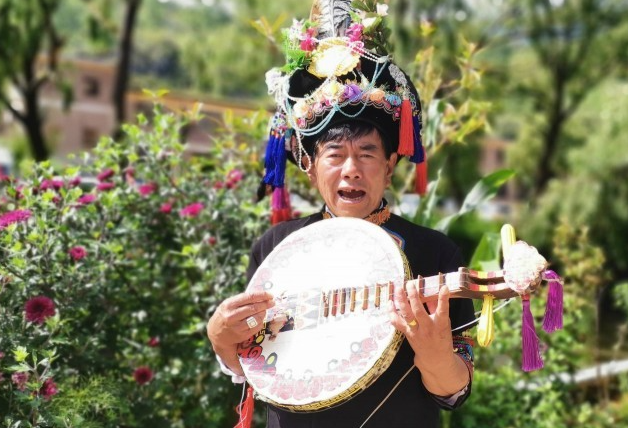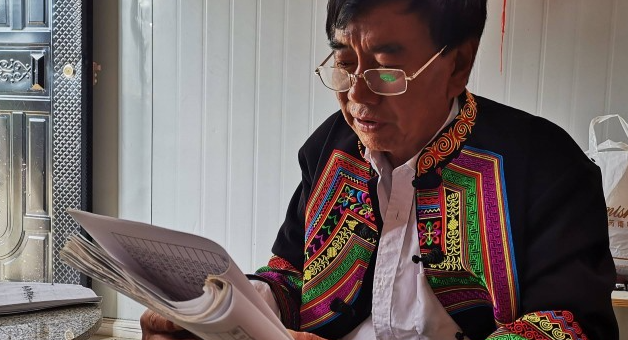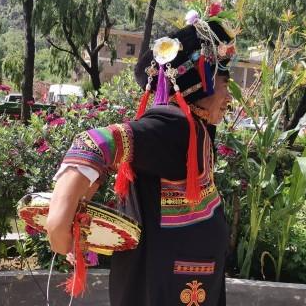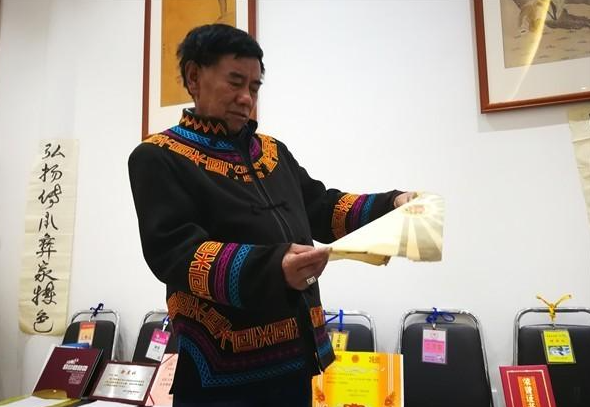Prince Yueqin, who has taught nearly 700 apprentices for free for 54 years
Wumeng has a famous name
——"Prince of Yueqin"
Many people have heard and watched "Prince of Yueqin" play the piano
But most people don't know his real name
Not to mention his 54-year piano playing career and legendary story

Playing the piano for a lifetime and inheriting the culture
The well-known "Prince of Yueqin" is Peng Yinfa, the inheritor of the Yi nationality Yueqin, an intangible cultural heritage of Zhaotong City. He was born in a village inhabited by Yi people in Wuzhai Yi and Miao Township, Yongshan County. His father's generation was also a folk artist who was engaged in Yueqin performances. He felt that this occupation was too hard and would make it difficult to achieve a great instrument. However, after going through the prenatal education of Yueqin, he began to hear and see, and Peng Yinfa's blood and bones planted Yueqin's genes. When he was five or six years old, he would play with Yueqin all day long, and he could play some tunes before he knew it.
In the Yizhai village where Peng Yinfa grew up, almost every household has the Yueqin, which can be played by every household, and the inheritance of the Yueqin is relatively common. He has no intention of reading, but Yueqin has his heart. When he was 12 years old, he was able to master the skills of Yueqin and began to play and sing independently, bringing happiness and joy to countless families. Since then, Yueqin has become the love of his life and his career for 54 years.

Continuously develop innovative techniques
Many ethnic groups in my country play the musical instrument, the Yueqin. Among them, the Yi nationality Yueqin stands out from the crowd, with its unique characteristics, unique style, representativeness and typicality. The essentials of the Yi Yueqin production lie in the traditional handwork, the dove tree material, and the two strings. Yueqin is mainly played with sonorous force, cadence, cheerfulness and comfort. The main tunes played in the Yi districts are basically original by local Yi compatriots.
Peng Yinfa has held two Yueqin in his life. His Yueqin is primitive in shape and only has two strings, but he loves it very much. The second Yueqin has been with him for more than 30 years and has been on the stage of many large-scale performances. Some people saw that his Yueqin was too primitive and outdated, so they paid a high price and bought him a Yueqin with perfect shape and many strings. He always felt that it was not as easy as his hand, and it was rarely used. The tune he often plays was originally created by people from the same village and has a long history. The tune is called "Gasamike". The song is divided into twelve sections. It tells the story of a pair of young men and women who meet by chance, fall in love at first sight, develop into mutual love, experience twists and turns during this period, heartbreaking, and finally a lover who finally becomes a family and ties the knot of happiness and joy. It vividly expresses the love between men and women, and sets off scenes of joy.
Peng Yinfa is bold and innovative in the technique of playing the yueqin, from the traditional technique of "holding the moon in his arms" in the sitting position, to the "top gospel" played by placing the yueqin on his head, and the "top gospel" played by placing the yueqin on the back. The "rebound pipa" played on the back also integrates playing and dancing, extending the single audibility of the traditional Yueqin to observability, greatly enhancing the artistic value of the performance.
Peng Yinfa continued to accumulate experience and gradually formed his own unique Yueqin playing style, and created three unique styles, namely, the unique shape of the Yueqin, the unique tune, and the unique way of playing. Therefore, the tunes played by him have been praised by many experts at home and abroad as the sound of nature, and by the folks as "Prince of Yueqin", and received numerous commendations and awards.
Playing red songs to transmit positive energy
"Gasamike" is Peng Yinfa's main piece. He also incorporates local Yi toast songs, Han folk songs, folk songs, and love songs into the performance content, makes full use of local resources, and increases the diversity, interest, attraction, and performance of performances. Appeal.
Peng Yinfa can become a folk artist and inheritor of intangible genetics. In addition to his own hard work and hard work, he is inseparable from the policy support of the party and the state, and the attention, encouragement, concern and help of various departments at all levels. Therefore, he has always been grateful, loved the party and patriotism, and always said: "I was born in New China and grew up under the red flag. It was the party and the government that made me and made me."

"On Wumeng Mountain, a developing hometown. The people are active and moving forward. After saying goodbye for decades, they are now on their way. Knowledge has changed the hometown, and science is the backbone. With the party's good policies, people's lives have changed. Industrious people, their hometown has changed a lot."
This is Peng Yinfa's recent lyric and composing thanksgiving song - "Hometown of the Yi Family". On the occasion of the 70th anniversary of the founding of New China, he used this song as a special gift to the motherland. This is how Peng Yinfa often integrates his simple and sincere feelings for the motherland, his hometown, and the people into his performances. He has practiced playing and singing red songs for a long time, and every time he performs, he is indispensable to red songs. He not only writes the lyrics, composes his own songs, but also plays and sings by himself. He also often leads the audience to play and sing together at the performance site, setting off a climax of the performance, which not only touched the audience, but also touched himself, created a harmonious and upward atmosphere, and conveyed positive energy.
Peach and plum are planted all over the road

There must be more inheritors of the excellent traditional culture of the Chinese nation. Peng Yinfa has made himself a clear social responsibility, which is to create a variety of channels to cultivate good inheritors of Yueqin. He was hired as a part-time teacher at the Wuzhai Yi and Miao Township Central School in Yongshan County. Through his performance and dissemination of the Yueqin, he has led many fans of Wumeng Mountain to play the Yueqin. As of 2019, 66-year-old Peng Yinfa has taught nearly 700 apprentices for free, many of whom are accomplished.
His grandson Peng Ai, who is in the third grade of high school, is the inheritor of his family's Yueqin. During the holiday, Peng Yinfa not only taught Peng Ai the skills of playing the yueqin, but also let Peng Ai understand the cultural world and the true meaning of art, inherit the national sentiment, cultivate love, and understand the responsibilities that he shoulders through playing the yueqin.
In October 2018, Peng Yinfa was employed at the Zhaotong Yi Sixth Patriarch Cultural Square in the suburbs of Zhaoyang. Every day, he played and sang the moon qin for an endless stream of Chinese and foreign tourists. Driven by the radiation of the tourists, he wanted to spread the sound of nature to the world.
 渝公网安备 50010702504639号
渝公网安备 50010702504639号